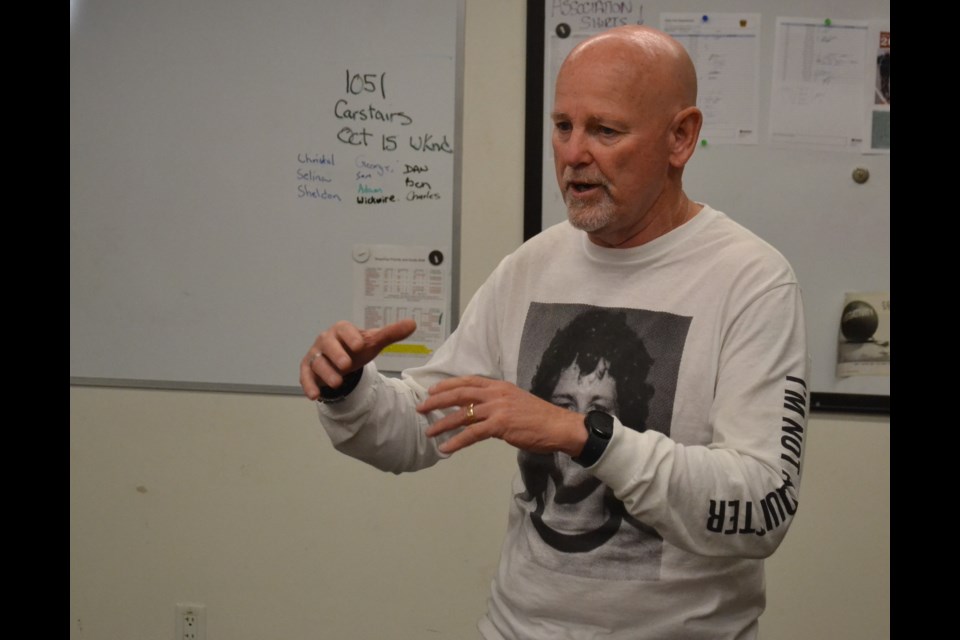OLDS — Ahead of this year’s Terry Fox Run fundraiser for cancer research, his brother Fred met with Town of Olds Mayor Judy Dahl, some local residents and representatives of the Albertan in the Olds fire hall on Sept. 15.
It was part of a tour Fred undertook to promote the run and Terry’s legacy. This year’s run took place on Sept. 18.
In 1980, after contracting cancer, Terry Fox, 22, raised money for research into the disease by attempting to run across Canada in the Marathon Of Hope.
His goal was to raise $1 for every Canadian. At that time Canada’s population was 24.1 million.
Unfortunately, he had to stop in northwestern Ontario because his cancer had progressed too far. He died not long afterward.
Fox’s dream was realized shortly after, when $24.17 million was raised for cancer research as a result of the Marathon of Hope.
Over the years, the one-day Terry Fox Run has been held across the world and so far has raised more than $850 million for cancer research.
Fred Fox is an ambassador for the Terry Fox Foundation. In that capacity, he travels the country promoting the Terry Fox Run. He came into the fire hall wearing a shirt with a photo of Terry Fox on the front and a saying down the sleeve that said, "I'm not a quitter."
By the time he reached Olds, Fred had been on the road for about 16 days, including time in Newfoundland.
This was the first time Fred had travelled on behalf of the foundation for a couple of years, due to COVID-19 pandemic restrictions.
Some people wondered what sign-ups for the run would be like this year after people hadn’t done so for a couple of years, but Fred said the uptake was surprisingly strong.
“Last year I think we raised $1 million more than we did in 2019," he said.
“I got a text from one of our gals in Toronto and right now in fundraising, we’re 30 per cent up where we were last year at this time, so it’s building right now.”
Fred said as a result of the money raised for cancer research by the Marathon of Hope and the Terry Fox Run, cancer patients now live much longer.
“I met a young woman in Saskatoon and she had the same type of cancer as Terry 15 years ago as a teenager and is alive today and didn’t have to have a leg amputated, so that’s where the research has gone,” he said.
Cancer patients today also benefit from prosthetics that are far better than the one Terry had, which he said was basically designed for walking, not running.
“Now the things they have today, you look at the Paralympic Games and see the technology,” Fred said.
He said Terry was inspired to make the run because, while getting chemotherapy in a Vancouver hospital, he saw the toll that chemo wrought on young kids.
As he tours schools across Canada, Fred is impressed with how familiar students today are about the story of his brother and his legacy.
“It’s part of the school curriculum now,” he said.
Fred said Terry was always a very determined kid.
"When I speak in schools, we talk about Terry being just like them,” he said. "He was just an average, ordinary kid. He had to work harder than anybody else I ever met.”
He recalled that when Terry was in Grade 8, he tried out for the school basketball team. But his coach said he wasn’t likely to make the team and encouraged him to try other sports.
But Terry wasn’t going to give up.
“He never quit and played. Junior high was Grade 8 to 10 and by the time he got to Grade 10 he was one of the starting guards and the captain of the team,” he said.
“That was through perseverance and hard work and everything else. That’s just the way he was.”
That story really impressed two young boys – Cash and Ben Didyk – who were at the fire hall to meet Fred. Ben is now in Grade 8 as well.
“There’s been a couple of times when I didn’t think I was going to do that well and yeah, I used to play basketball and I’m pretty sure – I didn’t think I was going to do well and I actually ended up being captain as well," Ben said.
Fred was asked what Terry likely would have done with his life, had he lived.
He said at the time, Terry was attending university, planning to be a high school teacher.
“Even if he had cancer, finished the Marathon of Hope, survived, he probably still would have carried on with that and done a lot of coaching. He was very involved at that point then in wheelchair basketball," he said.
“He played wheelchair basketball and other sports like that so he probably would have been a coach and a mentor and a teacher and everything else – and probably a parent as well.”




